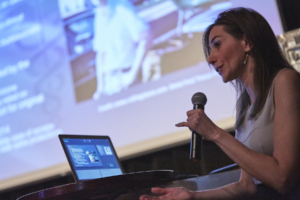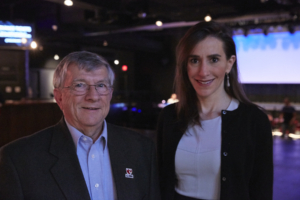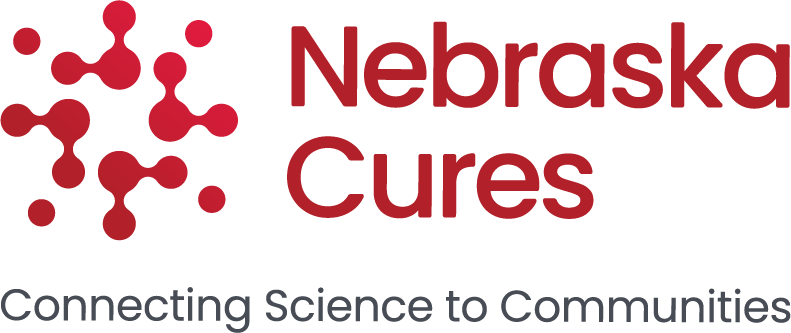Beth Roxland, J.D., M. Bioethics, is an experienced attorney and ethicist who has worked in a wide range of areas including law, government, academia, and the corporate world. She is the principal in a consultancy practice, Roxland Consultants, Ltd., which is a leader in the field of policy and strategic advising on issues related to health, medicine and clinical research. She presented “Do We Have the Right to Try? The Movement, the Law and the Societal Impact” at the Omaha Science Café on Tuesday at the Slowdown, 729 N. 14th St.. The presentation was held in conjunction with the Nebraska Science Festival, a nearly month-long event that tries to make science more interesting to the public.
“Right to Try” laws have been enacted in 41 states and at the federal level. Nebraska enacted a version in 2018, becoming the 40th state to approve such a law. Like in other states and at the federal level, the Right to Try law was intended to provide an alternative way for patients with life-threatening diseases who have failed approved treatments and those offered in clinical trials to have additional options to elect certain unapproved interventions.
Although the laws are titled “Right to Try,” in reality, it is simply a right to ask for such access, and provides no legal mandates or guarantees that it will happen.

Here are four sound bites from Roxland and a background news release on her presentation at the Omaha Science Cafe:
On what the Right to Try Act means to patients
“The right to try law generally means if they are the patient or that their loved ones or the people around them have an illness who have no other options or may have other options who are seeking experimental medications – drugs in development – may be able to access that drug that’s in development without going into a clinical trial.”
On how people should scrutinize new treatments being offered outside the realm of proven medical science (e.g. Stem Cell Clinics)
“If the patient is exploring new stem cell clinics and new stem cell options, I would encourage them to check with their state medical board, state licensure board, look at whether the doctor or the clinician that’s providing the treatments has been trained to do such things.”
On how people should check out advertised products that are outside the realm of proven medical science
“We don’t think about medicine as being a marketed product. We should start thinking about the information being presented and scrutinize that information as if it was a marketed product.”
On the importance of clinical trials
“The whole idea of clinical trials is actually to gather enough data that people can make informed decision on. There are a lot of people who don’t have the financial wherewithal to even enter a clinical trial if that clinical trial is not located nearby.”

About Beth Roxland, J.D., M.Bioethics
Roxland is a seasoned attorney and bioethicist with multifaceted experience across industry, law, government and academia. She is a senior consultant advising law firms, life science and biomedical entities, and professional associations on issues involving cutting-edge medical and scientific endeavors and formulating practical solutions to complex legal, ethical, operational and PR challenges. Previously, she served as Johnson & Johnson’s bioethics and strategy leader. Roxland also served as executive director of the New York State Task Force on Life and the Law, as well as the special advisor to the Commissioner of Health on Stem Cell Research Ethics in New York. In addition, Roxland was senior litigation associate at Simpson Thacher and Bartlett LLP, and a federal judicial law clerk in the Southern District of New York. Roxland graduated from Columbia University with a bachelor’s degree in biology and received a joint J.D. and master’s degree in bioethics magna cum laude from the University of Pennsylvania. She is a frequent public speaker, author and serves on several academic and research oversight boards.
About Nebraska Coalition for Lifesaving Cures
The Nebraska Coalition for Lifesaving Cures is an organization that believes stem cell research, therapies or cures that are permitted by federal law should be allowed in Nebraska. NCLC promotes, supports and advocates research to advance our quality of life and our economy.
About the Nebraska Science Festival
Presented by the University of Nebraska Medical Center, the Nebraska Science Festival is a collaboration of organizations and individuals interested in the advancement of science literacy. In addition to UNMC, other sponsors, included the Nebraska Coalition for Lifesaving Cures, Metro Credit Union, NEST 529 College Savings, Metropolitan Community College and media sponsors KETV and the Omaha World-Herald.
About NCLC Science Cafés
Science Cafés involve a face-to-face conversation with a scientist about current science topics. They are open to everyone (21 and older) and take place in casual settings like pubs and coffeehouses. Each meeting is organized around an interesting topic of conversation. A scientist gives a brief presentation followed by a Q-and-A period.
